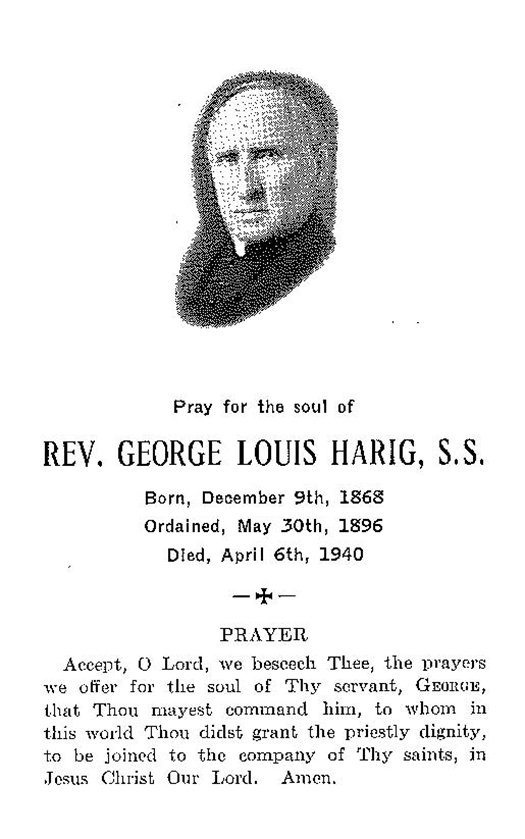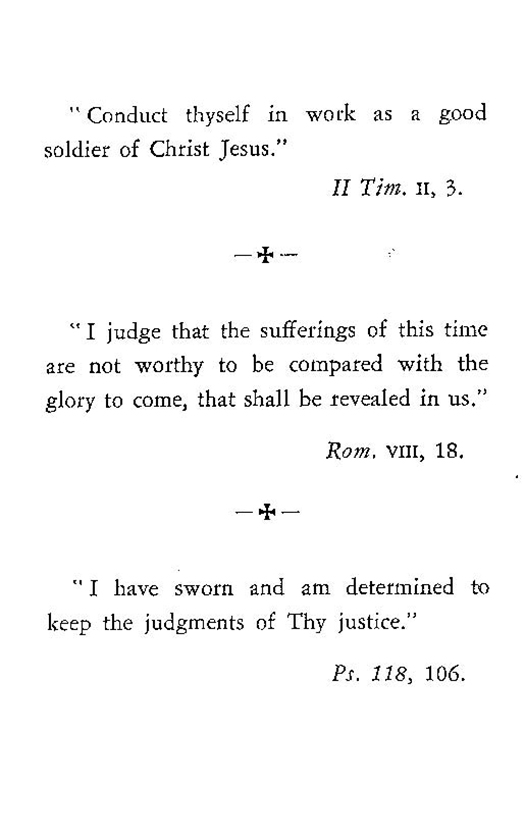Harig, Father George
1940, April 6
Date of Birth: 1868, December 9
Issy
May 25, 1940
Fathers and Dear Confreres:
Only three days before God called to Himself Our Most Eminent Father; Cardinal Verdier, one of our American confreres, Father Harig, left this earth for a better world. I want, for the benefit of his fellow countrymen and his friends – as well as for the edification of all – to go over his life for you.
George Louis Harig was born on December 9, 1868, at Louisville, Kentucky. His native city, Louisville, had been – with Bardstown – the Episcopal see of Bishop Flaget, the Apostle of Kentucky and one of the first Sulpicians in the United States. If he was of German descent from his father, through his mother, Frances Bredelle, he was connected to the French settlers who had peopled what Monsignor Joseph Schlarmann called the “French Empire in America.” He himself, quite naturally, considered himself merely as an American.
George Harig’s parents were good Christians. They entrusted him to the Brothers in Louisville. For eight years, from 1876 to 1884, George Harig remained their student. He kept the fondest memory of their school.
The idea of the priesthood had come to our future confrere. He welcomed it as a favor from God. He kept thinking of how to respond to it. His brother-in-law, Mr. Doyle, was glad to be of help. He brought George Harig to St. Charles College in Catonsville [actually, Ellicott City] and to our confrere who was his friend, Father Chapuis. His stay at St. Charles lasted six years. He was always a fine student, intelligent, pious, hard-working, conscientious in his duties, imbued with the best spirit. In the midst of young men avid for sport, he was not a sportsman. Under Father Haug’s direction or that of some other confrere, Father Harig preferred to devote his free time to manual labor. He loved to work in wood, to do wood-cutting, or to give himself over to carpentry of joining, for the needs of the house.
In 1890 Father Harig left St. Charles to enter St. Mary’s Seminary in Baltimore. He had there as his Philosophy teacher Father Dyer; Father Dyer’s students have not forgotten him. Profound, clear in his explanations, strict in his testing, demanding work from his students, Father Dyer loved his teaching and made it loved by those who could follow him without too much difficulty. Father Harig was one of them. So Father Dyer had no difficulty in taking notice of this seminarian, serious, hard-working, bright, who followed with pleasure and interest the teacher’s thought. Father Dyer did not forget his student, as we shall see from what follows.
In the course of his second year of Philosophy, Father Harig expressed the wish of becoming a Sulpician. That wish was taken under consideration by Father Magnien. But the Superior of St. Mary’s Seminary wanted to test Father’s Harig’s vocation. Father Harig was then only two years before he had been a student. He spent the school year of 1892-1893 there. The Superior, the confreres, and the students must have been satisfied with the young teacher; for, during the vacation period of 1893, Father Magnien sent Father Harig to Paris so that he might finish his priestly training at the Seminary of St. Sulpice. It was there that he did his Theology. During these three years he received all his orders and was ordained to the priesthood at the Church of St. Sulpice at the hands of Cardinal Richard.
Once a priest, Father Harig entered the Solitude at Issy. He spent there the year 1896-1897. That Solitude was to give a number of priests to our Canadian and American houses. Fathers François, Neveu, Guindon went to labor in Canada; Fathers Levatois and Saupin joined Father Harig in our American seminaries.
On his return to his native land, Father Harig received his first appointment. His Philosophy teacher at the Baltimore seminary was by then Superior of the major seminary in Dunwoodie, New York. He remembered his old student. If he did not immediately ask for him as co-worker, we may suppose that all the time he had his eye on him. For it was not to Dunwoodie that he was first sent, but to St. Charles. That indicates that during his year of probation he had been successful there. His main teaching there was the sciences. To that teaching he added Latin. In both subjects, Father Harig proved to be a fine teacher. The students liked him a lot, and he himself had no other ambition than to remain where he was. Father Dyer, the Dunwoodie Superior, was watching. He needed a teacher for First Philosophy. Right away, he thought of his old student, Father Harig. And our confrere, appointed to the New York major seminary, taught Philosophy there for two years, from 1903 to 1905.
From the Atlantic coast – where up to then he had exercised his Sulpician ministry – Father Harig was sent to the Pacific coast. He spent several years at the San Francisco seminary in Menlo Park; it was then the only Sulpician seminary in the western United States. There his classes were not all on the same level, for there were two communities in the one house, and Father Harig was called upon to serve in both the major seminary and the college. While teaching the natural sciences to the major seminarians, he was also teaching Mathematics to the minors, along with Elocution and Reading.
From San Francisco Father Harig returned to the east coast of the United States. He was appointed to St. Mary’s Seminary in Baltimore. Apparently his duties were cut down. In theory he was no more than teacher of Elocution and Master of Ceremonies. But in fact, he was a “jack of all trades.” A fine priest, it was up to him to train with the greatest care aspirants to the priesthood who more particularly sought him out, and all those on whom he could exercise his priestly influence. Whatever jobs were suggested to him, he took on; and he did them with meticulous care without losing time or heeding inconvenience. He was a man for detail. If he was given an assignment, it was sure to be done perfectly and conscientiously. He kept the priesthood and priestly training, up to the end, a very high ideal. So in public utterances and private talks, in carrying out his duties great or small, in the giving of opinions and in making observations, to his superiors or his penitents, and to his students, he seemed to be inspired by love of the Church and zeal for the training and sanctification of the Priest.
All the while, and with several relapses, dear Father Harig had much to suffer in mind and body. His suffering came to him, at least in part, from his great sensitive conscience and his conviction regarding the grandeur of the priesthood. Frequently our confrere had to leave the seminary to be cared for outside. He accepted this testing with great simplicity, and blamed himself for his condition. Sometimes he even took the initiative and spontaneously asked to retire to an institution where he was assured the care that would restore his health. But he always gladly came back to St. Mary’s Seminary, and took up his life simply, ready to do the work which his superiors might assign him. He set about his work with vigor, teaching the seminarians to speak slowly, to be distinct, to be conscious of pitch, to avoid monotone; all things very useful for priestly training and for success in their future ministry.
In these last months, Father Harig seemed very happy. He seemed no longer to feel the fears and phobias which tortured him in the terrible periods of physical and moral depression. He who was often so crushed was in fine fettel and willingly helping out in any way that was asked of him.
On Tuesday, April 2nd, during the afternoon, he became chilled in the woods. In the evening he was present at Spiritual Reading; no one seeing the pleasant smile that was usual with him could have imaged that Father Harig was unwell.
In the next day or so, since he had a fever (and the fever did not go down), he was brought to St. Agnes Hospital in Baltimore. His condition worsened very rapidly. He consented to receive the last sacraments. Our confreres, Fathers Lardner and Selner, were there. They recited the prayers for the dying. But thinking that the dear patient would still live for some days, they went away. Hardly had they left when Father Harig, with his mind at rest and a prayer on his lips, was called to God.
It was a very trustful and gentle death for a priest who often feared, in hours of depression when his mood was dark, that he would not get to Heaven. It was a very comforting death for those he left after him. The dear deceased never despaired in life and – in spite of the testing which crushed him – had made the best use of what was his.
Please, Fathers and dear confreres, pray for the repose of Father Harig’s soul, and accept the expression of my fraternal affection in Our Lord.
P. Boisard
Vice-Superior General of St. Sulpice


